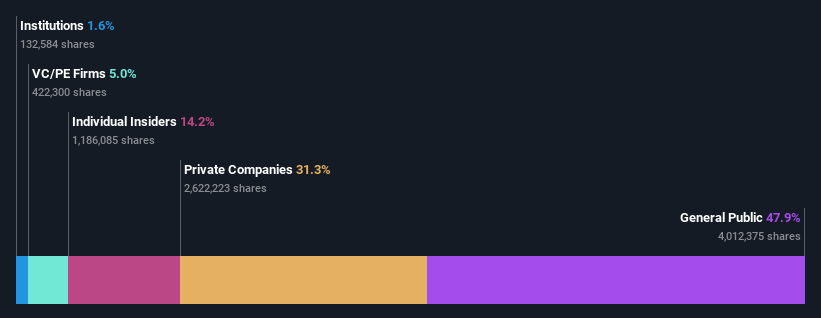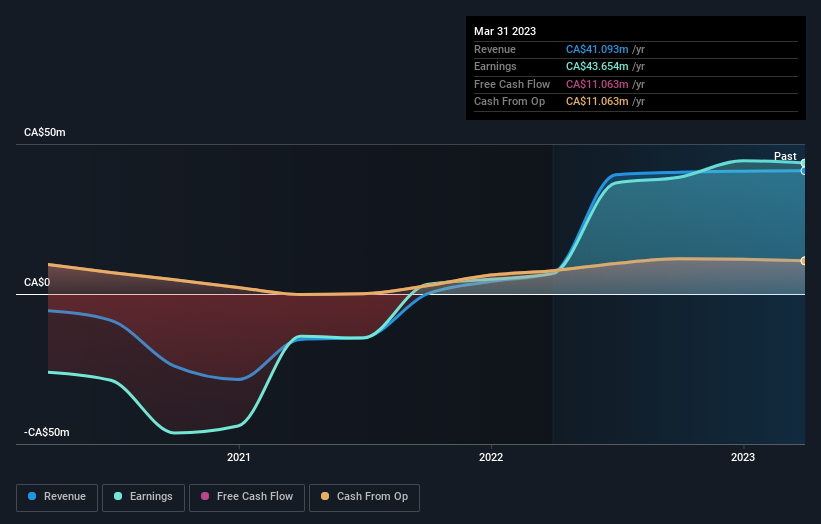While private companies own 31% of SIR Royalty Income Fund (TSE:SRV.UN), retail investors are its largest shareholders with 48% ownership
Key Insights
Significant control over SIR Royalty Income Fund by retail investors implies that the general public has more power to influence management and governance-related decisions
The top 6 shareholders own 50% of the company
Every investor in SIR Royalty Income Fund (TSE:SRV.UN) should be aware of the most powerful shareholder groups. And the group that holds the biggest piece of the pie are retail investors with 48% ownership. In other words, the group stands to gain the most (or lose the most) from their investment into the company.
Meanwhile, private companies make up 31% of the company’s shareholders.
Let's delve deeper into each type of owner of SIR Royalty Income Fund, beginning with the chart below.
View our latest analysis for SIR Royalty Income Fund
What Does The Institutional Ownership Tell Us About SIR Royalty Income Fund?
Many institutions measure their performance against an index that approximates the local market. So they usually pay more attention to companies that are included in major indices.
Since institutions own only a small portion of SIR Royalty Income Fund, many may not have spent much time considering the stock. But it's clear that some have; and they liked it enough to buy in. So if the company itself can improve over time, we may well see more institutional buyers in the future. When multiple institutional investors want to buy shares, we often see a rising share price. The past revenue trajectory (shown below) can be an indication of future growth, but there are no guarantees.
Hedge funds don't have many shares in SIR Royalty Income Fund. SIR Corp. is currently the company's largest shareholder with 15% of shares outstanding. For context, the second largest shareholder holds about 14% of the shares outstanding, followed by an ownership of 11% by the third-largest shareholder.
We also observed that the top 6 shareholders account for more than half of the share register, with a few smaller shareholders to balance the interests of the larger ones to a certain extent.
Researching institutional ownership is a good way to gauge and filter a stock's expected performance. The same can be achieved by studying analyst sentiments. As far as we can tell there isn't analyst coverage of the company, so it is probably flying under the radar.
Insider Ownership Of SIR Royalty Income Fund
While the precise definition of an insider can be subjective, almost everyone considers board members to be insiders. The company management answer to the board and the latter should represent the interests of shareholders. Notably, sometimes top-level managers are on the board themselves.
I generally consider insider ownership to be a good thing. However, on some occasions it makes it more difficult for other shareholders to hold the board accountable for decisions.
It seems insiders own a significant proportion of SIR Royalty Income Fund. Insiders own CA$23m worth of shares in the CA$160m company. It is great to see insiders so invested in the business. It might be worth checking if those insiders have been buying recently.
General Public Ownership
With a 48% ownership, the general public, mostly comprising of individual investors, have some degree of sway over SIR Royalty Income Fund. This size of ownership, while considerable, may not be enough to change company policy if the decision is not in sync with other large shareholders.
Private Equity Ownership
Private equity firms hold a 5.0% stake in SIR Royalty Income Fund. This suggests they can be influential in key policy decisions. Some investors might be encouraged by this, since private equity are sometimes able to encourage strategies that help the market see the value in the company. Alternatively, those holders might be exiting the investment after taking it public.
Private Company Ownership
We can see that Private Companies own 31%, of the shares on issue. It might be worth looking deeper into this. If related parties, such as insiders, have an interest in one of these private companies, that should be disclosed in the annual report. Private companies may also have a strategic interest in the company.
Next Steps:
I find it very interesting to look at who exactly owns a company. But to truly gain insight, we need to consider other information, too. For example, we've discovered 2 warning signs for SIR Royalty Income Fund (1 doesn't sit too well with us!) that you should be aware of before investing here.
If you would prefer check out another company -- one with potentially superior financials -- then do not miss this free list of interesting companies, backed by strong financial data.
NB: Figures in this article are calculated using data from the last twelve months, which refer to the 12-month period ending on the last date of the month the financial statement is dated. This may not be consistent with full year annual report figures.
Have feedback on this article? Concerned about the content? Get in touch with us directly. Alternatively, email editorial-team (at) simplywallst.com.
This article by Simply Wall St is general in nature. We provide commentary based on historical data and analyst forecasts only using an unbiased methodology and our articles are not intended to be financial advice. It does not constitute a recommendation to buy or sell any stock, and does not take account of your objectives, or your financial situation. We aim to bring you long-term focused analysis driven by fundamental data. Note that our analysis may not factor in the latest price-sensitive company announcements or qualitative material. Simply Wall St has no position in any stocks mentioned.
Join A Paid User Research Session
You’ll receive a US$30 Amazon Gift card for 1 hour of your time while helping us build better investing tools for the individual investors like yourself. Sign up here


